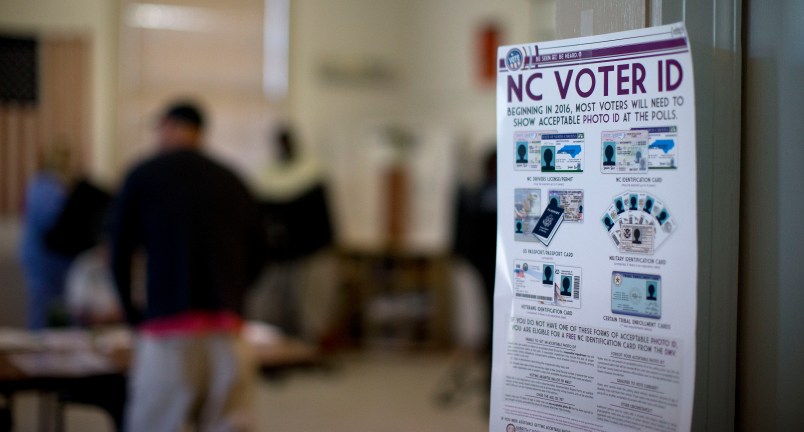The North Carolina State Board of Elections on Friday voted to fight controversial subpoenas, from the U.S. Attorney’s Office in Eastern North Carolina, seeking a massive amount of voting records.
The board vote came after federal prosecutors had extended the deadline for the election officials to turn over the records. The state board said that the subpoena was still “overly broad, unreasonable, vague and clearly impacts significant interests to our voters.” The board voted to authorize the state attorney general to seek to quash the subpoena and any associated subpoenas in court.
The board also passed a motion to take similar steps regarding the subpoenas sent to 44 counties in North Carolina also seeking the voting records. Both motions were passed unanimously by the board, which is made up of four Democrats, four Republicans and one member not affiliated with either party.
“This board will, as required by our fiduciary responsibility as state election officials, not stand idly by and consent to an agency attempting to obtaining records and documents that violate the principles of overreach, by the federal government,” the board’s vice-chair Joshua Malcolm said reading the board’s motion.
The Justice Department’s move last week to subpoena the voting records, on behalf of an investigation being led by ICE, drew national scrutiny and condemnation from election officials. Critics argued that, at best, the subpoena would drain the resources of already over-extended election officials, and at worst, was part of a fishing expedition that would intimidate eligible voters.
Some noted that the investigation resembled the type of inquiry that President Trump’s now defunct voter fraud commission sought to conduct.
The subpoenas requested some 15 million records, and initially gave the election officials a Sept. 25 deadline, which stood to severely disrupt planning for the 2018 midterms. The records requested include some that were already publicly available, according to the state election officials, as well as some records — including actual ballots cast — with confidential voter information that the officials are prohibited by state law from turning over.
The subpoenas came after the same U.S. Attorney’s Office charged 19 non-citizens for voting in 2016. A spokesperson for the U.S. Attorney’s office declined to comment on Friday’s State Board of Elections vote.
On Thursday, the U.S. Attorney’s Office sent elections officials a letter offering to extend the deadline for producing the documents until January 2019. The letter also said the prosecutors were “willing to discuss” potentially narrowing the subpoenas.
The state board’s chairman Andy Penry recounted on Friday’s teleconference the confusion arising from how the Justice Department went about delivering the subpoenas. He said the state board and its lawyers received no advance warning — before the the subpoena was faxed 5 p.m. last Friday, before the Labor Day weekend — that federal investigators were seeking the records. The state officials received calls from county officials inquiring whether the subpoenas were “legitimate” or a fake effort to obtain voter information. Only some of the 44 counties were faxed the subpoenas and it was not clear if faxing them counted as legally serving them, according to the state elections officials.
Penry said that Thursday’s letter, sent after widespread media reports of the subpoenas, was the first communication the board had received from the U.S. Attorney’s office offering a compromise.
“Once the U.S. Attorney was made aware that there was going to be an election in November and we had some role in it, they decided it was not as urgent as their subpoena said,” Penry said. He also said the state officials had received no information from the feds as to why all of those records were needed.
“Candidly, I can’t think of any reason,” he said.
Thursday’s letter had claimed that initial September deadline reflected concern the election officials would destroy the records and that the state officials had agreed to preserve them.
“We have no intention of putting our servers in airplanes to Ecuador,” Penry said.







Lil’ Beauregard is trying to get back in Dotards’ good graces?
After all, why would you flee one banana republic to another?
Fight they should. I am at a loss to what need does ICE have in the voting records?
Kind of burying the lede, aren’t we? Considering that there are multiple issues going on with NC elections at the moment (e.g. state Supreme Court ruled it’s too late to redraw gerrymandered districts for 2018 election), this seems very relevant information for the headline, or at least the first paragraph. Paragraph five seems a bit late to explain who’s subpoenaing the files and why.
Who are these trigger-happy prosecutors and who is pulling the strings supporting this fishing expedition?